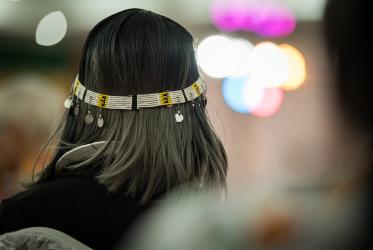Indigenous peoples are not only on the frontline of climate change impacts, they are also uniquely equipped with expertise to help defend ecology. Two groups - the Ecumenical Indigenous Peoples’ Networks Reference Group and the Working Group on Climate Change of the World Council of Churches (WCC) - underscored this idea as they met to discuss the world’s climate emergency. Both are composed of theologians, indigenous persons, scientists and experts on ecology and economy, representing churches from around the world.
Brought together by a common concern for the planet’s deepening ecological fragility, the two groups met for the first time at the Yushan Theological Seminary in Hualien on the eastern coast of Taiwan.
Rev. Mari Valjakka, moderator of the reference group and a Sami from Finland, shared how climate change and development projects are undermining Indigenous ways of living in the Arctic, a region which is heating up faster than other parts of the world. “Reindeer herders are losing their livelihoods,” she said.
Even as indigenous peoples are in the frontline of climate impacts, Frances Namoumou, from the Pacific Conference of Churches based in Fiji and a member of the working group, pointed out that “indigenous peoples do not only have the stories, we have the practical and technical expertise to combat climate change and defend ecology.”
Seed banks established by indigenous women are a concrete example. Renemsongla Ozukum, an indigenous person from the Ao-Naga Tribe in North East India and participating as part of the working group, brought to the gathering climate-resilient seeds from Nagaland “that can flourish even in extreme weather conditions.”
Indeed several studies have confirmed the critical contribution of indigenous peoples in protecting the ecosystem. In particular, a recently released Intergovernmental Science-Policy Platform on Biodiversity and Ecosystem Services study notes that while biodiversity loss has accelerated alarmingly since the 1970s, this has been curbed and even avoided in areas managed or controlled by indigenous peoples.
The meeting explored the role of churches and theology. Emphasising the need to go beyond western notions of ownership and even stewardship, Rev. Chebon Glen Kernell from the United Methodist Church in the USA and a member of the reference group, shared that from an indigenous perspective, human beings are called to be “spiritual participants in and with creation.” This recognises a relationship of equality between human beings and all creation whilst at the same time challenges the notion of human beings having power and dominion over creation. Such a mutually respectful relationship affords humanity a key role in the protection and healing of creation.
Highlighting the importance of strengthening Indigenous representation and participation, the meeting discussed joint strategies for advocating for climate justice at the United Nations.
They agreed to develop a joint communique with the aim of putting climate change and overall ecological crisis at the top of the ecumenical agenda at the upcoming 11th Assembly of the WCC in Karlsruhe. This in view of the findings of the UN Intergovernmental Panel on Climate Change Special Report on 1.5 C warming released last year which reveals that there is a limited and rapidly closing window, perhaps less than 10 years, to transform lifestyles and economic structures and prevent catastrophic climate change.
Hosted by the Presbyterian Church in Taiwan from 23-30 June, the gathering is only the beginning of deeper collaboration to advance indigenous peoples’ rights and climate justice, recognising that the two are intrinsically intertwined.
“The Presbyterian Church in Taiwan has a deep-rooted Indigenous ministry with more than a third of its churches being indigenous,” noted Rev Lian Chin-Siong, ecumenical officer, in his welcome remarks. At the same time, Taiwan is also feeling the impacts of climate change, not least through increasingly powerful and destructive typhoons, he said.
Learn more about WCC's work on Care for Creation and Climate Justice






